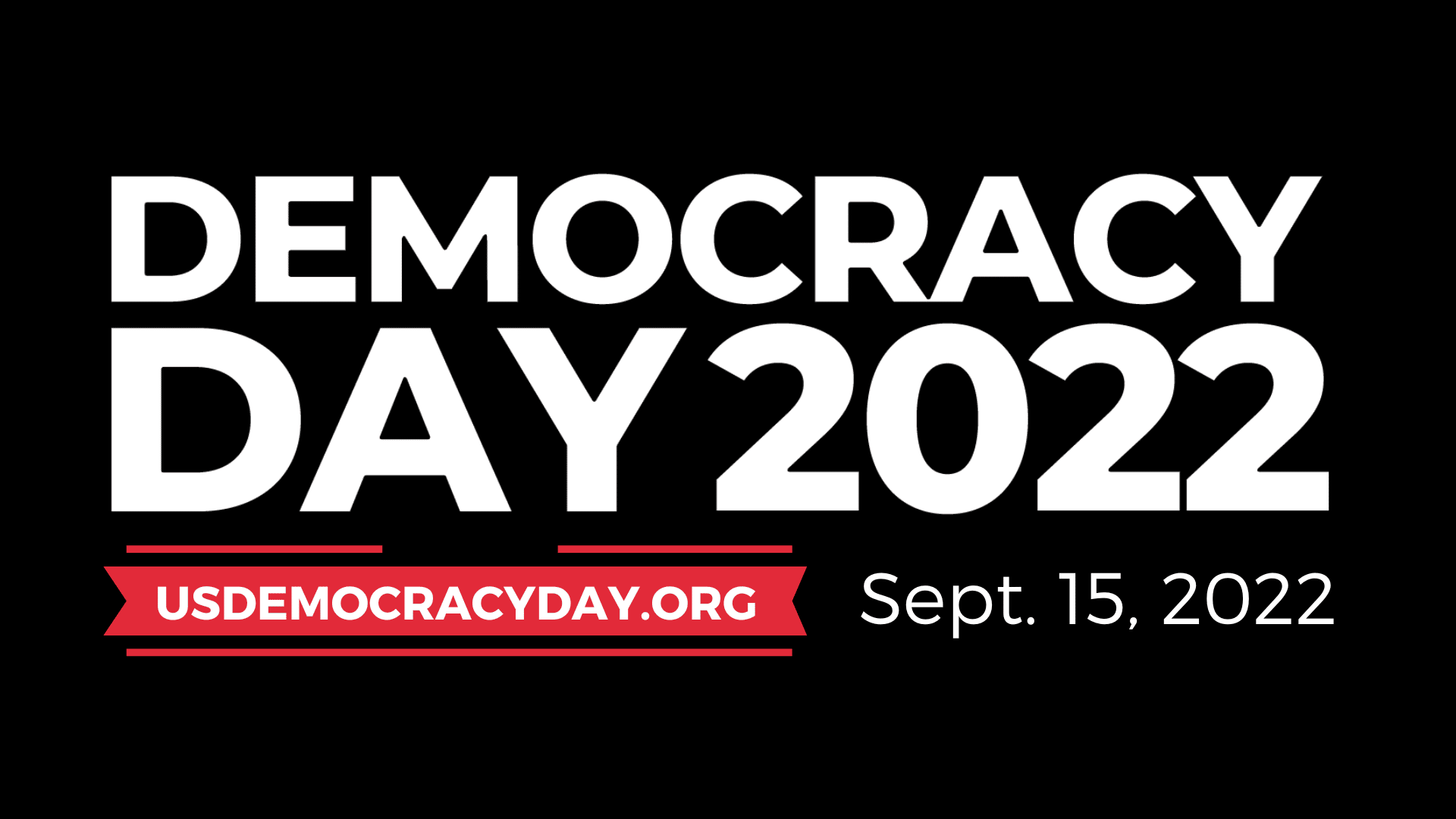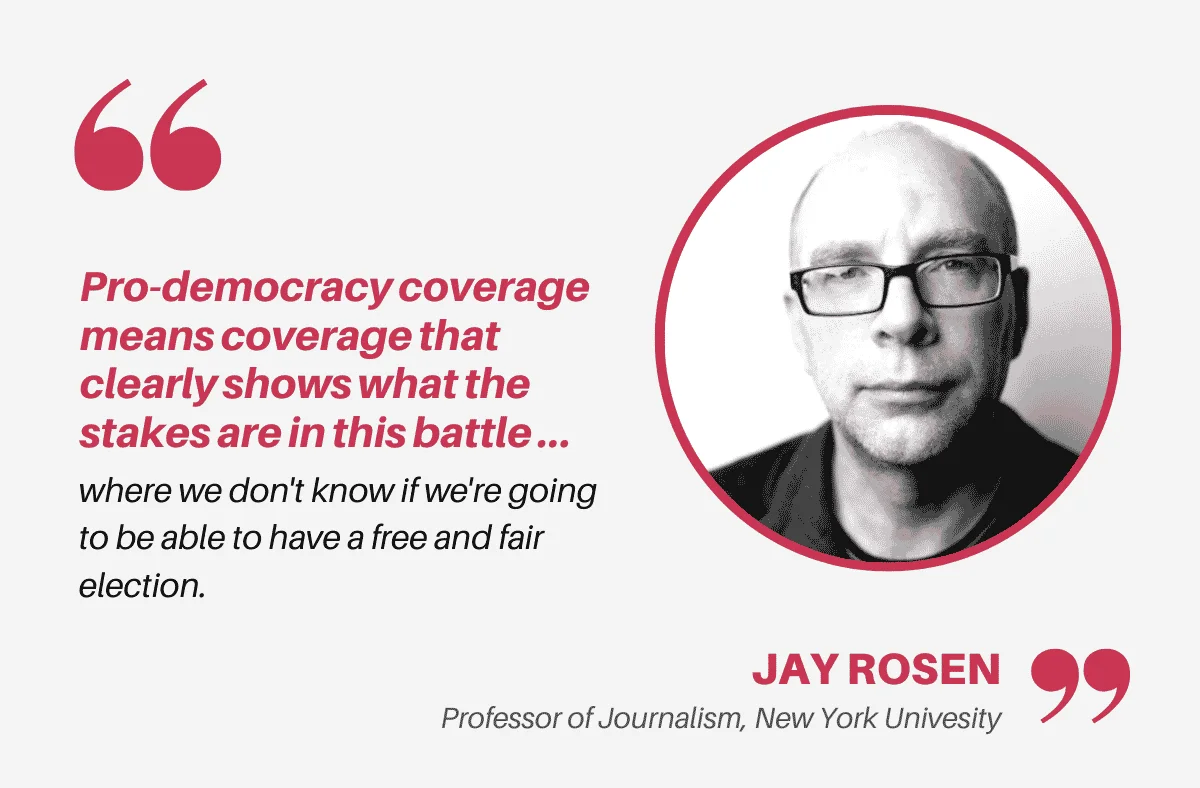Beyond the ‘Democracy Desk’: Why U.S. newsrooms need to become explicitly pro-democracy
By Jay Rosen, professor of journalism, New York University
I have some high level remarks about the problems that we face, because we in the U.S., as Michael Bolden suggested, are part of a global shift that scholars call “democratic backsliding.”
It’s happening around the world, and the U.S. is becoming one of the leaders in this dark art.
Democratic backsliding, which is the tendency for a democratic system to decay, presents huge problems for journalists as they try to inform the American public. Democracy used to be a background condition of doing journalism, something that you could assume, something that made journalism possible. Its basic mechanics could be relied upon.
But we’re now seeing that a lot of our democracy runs on a kind of honor system, in which informal codes of conduct and political conventions hold a lot of power, because both parties agree to them. This is especially true of the way we run elections in the United States. A huge part of running elections is the volunteers and other poll workers who administer the election under a code of non-partisanship and fairness that doesn’t have any legal force.
And we are now seeing that, under conditions of democratic backsliding, all the informal parts of the system are weak points and attack surfaces.
And that’s part of what we mean by a “crisis of democracy.” The informal networks that kept democracy strong are collapsing and sentiment is shifting, in many ways, against democracy.
So under these conditions, myself and other observers have been arguing that the American press needs to become more explicitly pro-democracy, as opposed to allowing it to sit in the background as an assumption or condition.
And this makes a certain amount of sense. But there’s a lot of problems with this claim— that journalists need to become more pro-democracy. In fact, this meeting that we’re at, and Democracy Day 2022, are examples of being more pro-democracy.
But there are a lot of problems with that concept. The first problem that I’ve encountered is journalists immediately say to me, “Okay, but what does that mean in practice?”
Which is a fair question and a really important question, but we don’t necessarily know the answer to that until we get people to start experimenting with being more pro-democracy. But if the cost of experimenting is knowing in advance — “what does that look like in practice?” — then we’re never going to do the experiments.
So that’s one of the problems.
Another problem with telling journalists they need to become more pro-democracy is that you immediately hear in reply, from both from journalists and critics, “Pro-democracy? That sounds like being pro-Biden,” which, of course, is not the role of newsrooms. And nobody wants their newsroom to declare itself pro-Biden or pro-Democratic Party.
And so that fear of being criticized for being partisan is also one of the things in the way of putting a more pro-democracy philosophy in journalism into practice.
Another strange problem with becoming more pro-democracy is that there’s a tendency in journalism to say, “Democracy is at risk? Well, we’re going to cover that!” And almost every problem in journalism can be responded to that way— by just adding some coverage.
And so this has been one of the reflexes of the journalism profession since this backsliding started to happen, which is, “we’re going to cover it as we would cover any other story.” But the problem is, it’s not quite like any other story, because it threatens the very conditions under which journalism can be transacted. And that’s slightly bigger than a new democracy desk — even though a democracy desk might be a really good addition to your newsroom.
Under those conditions, an answer I have come to is that pro-democracy coverage means, in part, coverage that clearly shows what the stakes are in this battle for American democracy and the elections coming up, where we don’t know if we’re going to be able to have a free and fair election. And news coverage that more clearly and dramatically shows the stakes — what is at stake in this nest of problems that I described, that Michael Bolden described — is, I think, one of the ways out of this puzzle. The puzzle of “how do you get to ‘more pro-democracy coverage’ until you start doing it?”
So making it crystal clear what the stakes are, seems to me to be a more muscular and effective way of doing journalism than what we’ve had up to now. And I and I look forward to seeing it develop with some of the newsrooms represented in this group.
🏦 Questions about Democracy Day? Need more info? Get in touch!
Email us for more info about how to become a partner or financially support Democracy Day.
Still have questions? Contact the Center for Cooperative Media directly by sending an email to [email protected].
Jay Rosen is a writer, and a professor of journalism at New York University. Read his work on PressThink or follow him on Twitter @jayrosen_nyu.
About the Center for Cooperative Media: The Center is a grant-funded program of the School of Communication and Media at Montclair State University. Its mission is to grow and strengthen local journalism, and in doing so serve New Jersey residents. The Center is supported with funding from Montclair State University, the Geraldine R. Dodge Foundation, Democracy Fund, the New Jersey Local News Lab (a partnership of the Geraldine R. Dodge Foundation, Democracy Fund, and Community Foundation of New Jersey), and the Abrams Foundation. For more information, visit CenterforCooperativeMedia.org.


